[ad_1]
 I’ve often wondered what happens to clothes that can’t be sold. And I’ve covered this before when thinking about the “Championship” clothing of a team that lost. But it turns out, unfortunately, that there is so much more material waste in this world that we never think about. A mountain of discarded clothing, including Christmas sweaters and ski boots, cuts a strange sight in Chile’s Atacama, the driest desert in the world, which is increasingly suffering from pollution created by fast fashion. Chile has long been a hub of second-hand and unsold clothing, made in China or Bangladesh and passing through Europe, Asia or the United States before arriving in Chile, where it is resold around Latin America. Some 59,000 tons of clothing arrive each year at the Iquique port in the Alto Hospicio free zone in northern Chile. Clothing merchants from the capital buy some, while much is smuggled out to other Latin American countries. But at least 39,000 tons that cannot be sold end up in rubbish dumps in the desert. The clothing s not biodegradable and changes need to happen. Now is the time to make this happen, especially as supply chain companies around the world make their pledge towards sustainability. And now on to this week’s logistics news.
I’ve often wondered what happens to clothes that can’t be sold. And I’ve covered this before when thinking about the “Championship” clothing of a team that lost. But it turns out, unfortunately, that there is so much more material waste in this world that we never think about. A mountain of discarded clothing, including Christmas sweaters and ski boots, cuts a strange sight in Chile’s Atacama, the driest desert in the world, which is increasingly suffering from pollution created by fast fashion. Chile has long been a hub of second-hand and unsold clothing, made in China or Bangladesh and passing through Europe, Asia or the United States before arriving in Chile, where it is resold around Latin America. Some 59,000 tons of clothing arrive each year at the Iquique port in the Alto Hospicio free zone in northern Chile. Clothing merchants from the capital buy some, while much is smuggled out to other Latin American countries. But at least 39,000 tons that cannot be sold end up in rubbish dumps in the desert. The clothing s not biodegradable and changes need to happen. Now is the time to make this happen, especially as supply chain companies around the world make their pledge towards sustainability. And now on to this week’s logistics news.
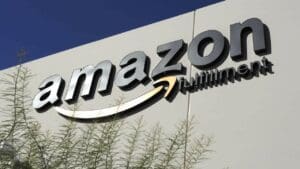 Amazon is constantly looking at new ways to reach its customers. The company is offering U.S. customers $10 to pick up a purchase rather than have it shipped to a home address, as the e-commerce giant joins other retailers in racing to slash costs for home delivery and returns amid slack consumer demand. Amazon said the promotion is not a cost-cutting measure and that it applies to customers who have never used Amazon Pickup or have not used that service in the last 12 months. Over the last few days Amazon has emailed an undisclosed number of its shoppers offering them $10 to retrieve an order of $25 or more at company pickup points at locations such as Whole Foods, Amazon Fresh or Kohl’s stores.
Amazon is constantly looking at new ways to reach its customers. The company is offering U.S. customers $10 to pick up a purchase rather than have it shipped to a home address, as the e-commerce giant joins other retailers in racing to slash costs for home delivery and returns amid slack consumer demand. Amazon said the promotion is not a cost-cutting measure and that it applies to customers who have never used Amazon Pickup or have not used that service in the last 12 months. Over the last few days Amazon has emailed an undisclosed number of its shoppers offering them $10 to retrieve an order of $25 or more at company pickup points at locations such as Whole Foods, Amazon Fresh or Kohl’s stores.
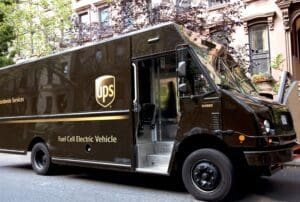 Healthcare logistics has been a bright spot for UPS amid an overall decline in delivery demand. It is also an attractive segment for carriers to invest in since it’s generally more profitable on a per-shipment basis than business-to-consumer deliveries. One big step UPS took toward that goal was its acquisition of Bomi Group in November 2022. The deal for the healthcare logistics provider allows UPS to boost its cold chain capabilities in Europe and Latin America with the addition of temperature-controlled facilities in 14 countries and 3,000 employees. UPS will add 2.3 million square feet of healthcare logistics space in its global network this year, CFO Brian Newman said on the call. At 2022’s end, the company had around 17 million square feet of “healthcare-compliant warehousing,” according to its 10-K.
Healthcare logistics has been a bright spot for UPS amid an overall decline in delivery demand. It is also an attractive segment for carriers to invest in since it’s generally more profitable on a per-shipment basis than business-to-consumer deliveries. One big step UPS took toward that goal was its acquisition of Bomi Group in November 2022. The deal for the healthcare logistics provider allows UPS to boost its cold chain capabilities in Europe and Latin America with the addition of temperature-controlled facilities in 14 countries and 3,000 employees. UPS will add 2.3 million square feet of healthcare logistics space in its global network this year, CFO Brian Newman said on the call. At 2022’s end, the company had around 17 million square feet of “healthcare-compliant warehousing,” according to its 10-K.
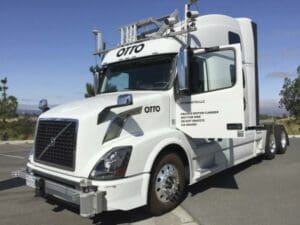 In a hearing before the House Committee on Transportation and Infrastructure, Transportation Intermediaries Association (TIA) President & CEO Anne Reinke provided solutions to alleviate the supply chain disruptions and improve the free flow movement of goods. She also highlighted the role that logistics companies play in the supply chain. “While there is not one single solution or action that will immediately alleviate the supply chain disruption, several solutions exist that would help improve the movement of goods,” noted Reinke. “The safest and most secure marketplace is also the most efficient and functional marketplace.” Reinke suggested the Federal Motor Carrier Safety Administration (FMCSA) prioritize a few safety issues, including the development of a more robust and effective motor carrier safety rating process. Currently, the FMCSA uses an outdated physical audit system, but it doesn’t have the proper resources to conduct safety inspections for the vast majority of motor carriers. Consequently, 92% of trucking companies are unrated, causing confusion and uncertainty in the vetting process for TIA members.
In a hearing before the House Committee on Transportation and Infrastructure, Transportation Intermediaries Association (TIA) President & CEO Anne Reinke provided solutions to alleviate the supply chain disruptions and improve the free flow movement of goods. She also highlighted the role that logistics companies play in the supply chain. “While there is not one single solution or action that will immediately alleviate the supply chain disruption, several solutions exist that would help improve the movement of goods,” noted Reinke. “The safest and most secure marketplace is also the most efficient and functional marketplace.” Reinke suggested the Federal Motor Carrier Safety Administration (FMCSA) prioritize a few safety issues, including the development of a more robust and effective motor carrier safety rating process. Currently, the FMCSA uses an outdated physical audit system, but it doesn’t have the proper resources to conduct safety inspections for the vast majority of motor carriers. Consequently, 92% of trucking companies are unrated, causing confusion and uncertainty in the vetting process for TIA members.
 Labor unions are celebrating a bill signed into law in Washington state that offers new protections to warehouse workers, pushing back against fulfillment productivity quotas in the very state where retail giant Amazon first set the standard for lightning-fast delivery windows. In a statement, the International Brotherhood of Teamsters commended Washington Gov. Jay Inslee and members of the state legislature for enacting House Bill 1762, an Act Relating to Protecting Employees of Warehouses (HB 1762). “For far too long, warehouse workers have been risking grievous bodily harm in order to not lose their jobs, creating a sense of fear every time they clock in. These laws ensure that nobody shall be required to meet a quota that risks their health, safety, ability to take breaks, or even do something as simple as use the bathroom,” John Scearcy, Teamsters Local 117 Secretary-Treasurer, said in a release.
Labor unions are celebrating a bill signed into law in Washington state that offers new protections to warehouse workers, pushing back against fulfillment productivity quotas in the very state where retail giant Amazon first set the standard for lightning-fast delivery windows. In a statement, the International Brotherhood of Teamsters commended Washington Gov. Jay Inslee and members of the state legislature for enacting House Bill 1762, an Act Relating to Protecting Employees of Warehouses (HB 1762). “For far too long, warehouse workers have been risking grievous bodily harm in order to not lose their jobs, creating a sense of fear every time they clock in. These laws ensure that nobody shall be required to meet a quota that risks their health, safety, ability to take breaks, or even do something as simple as use the bathroom,” John Scearcy, Teamsters Local 117 Secretary-Treasurer, said in a release.
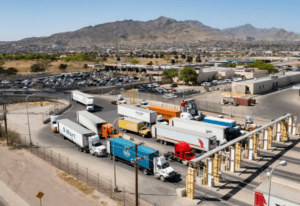 After causing long wait times for thousands of trucks, Texas officials have reduced the number of inspections for tractor-trailers arriving from Mexico at two border crossings, according to a U.S. Customs and Border Protection (CBP) official. Governor Greg Abbott’s increased inspections of trucks, which began last Tuesday, created wait times of up to 26 hours for commercial traffic at Veterans International Bridge in Brownsville and the Free Trade International Bridge in the town of Los Indios. The inspections are being carried out by the Texas Department of Public Safety (DPS). The safety inspections have not ended completely. DPS conducts these safety exams, but at a small percentage each day,” Armando Taboada, assistant director of field operations at CBP’s Laredo Field Office. The issue we had is that they were inspecting 100% [of trucks].” Taboada said CBP was able to keep normal hours of operation for the commercial facilities at both the Veterans and Los Indios bridges last week, despite the disruption caused by the DPS inspections.
After causing long wait times for thousands of trucks, Texas officials have reduced the number of inspections for tractor-trailers arriving from Mexico at two border crossings, according to a U.S. Customs and Border Protection (CBP) official. Governor Greg Abbott’s increased inspections of trucks, which began last Tuesday, created wait times of up to 26 hours for commercial traffic at Veterans International Bridge in Brownsville and the Free Trade International Bridge in the town of Los Indios. The inspections are being carried out by the Texas Department of Public Safety (DPS). The safety inspections have not ended completely. DPS conducts these safety exams, but at a small percentage each day,” Armando Taboada, assistant director of field operations at CBP’s Laredo Field Office. The issue we had is that they were inspecting 100% [of trucks].” Taboada said CBP was able to keep normal hours of operation for the commercial facilities at both the Veterans and Los Indios bridges last week, despite the disruption caused by the DPS inspections.
 Import cargo volume at the nation’s major container ports is climbing back from a nearly three-year low in February, but is expected to remain well below last year’s levels heading into this fall, according to a report from the National Retail Federation (NRF) and Hackett Associates. “With economic uncertainty continuing, the impact on trade is clear,” Hackett Associates Founder Ben Hackett said in a release, noting continued high inflation, Federal Reserve interest rate hikes, and recent bank failures. “Year-over-year import volumes have been on the decline at most ports since late last year and declining exports out of China highlight the slowdown in demand for consumer goods. Our forecast now projects a larger decline in imports in the first half of this year than we forecast last month. Our view is that imports will remain below recent levels until inflation rates and inventory surpluses are reduced.”
Import cargo volume at the nation’s major container ports is climbing back from a nearly three-year low in February, but is expected to remain well below last year’s levels heading into this fall, according to a report from the National Retail Federation (NRF) and Hackett Associates. “With economic uncertainty continuing, the impact on trade is clear,” Hackett Associates Founder Ben Hackett said in a release, noting continued high inflation, Federal Reserve interest rate hikes, and recent bank failures. “Year-over-year import volumes have been on the decline at most ports since late last year and declining exports out of China highlight the slowdown in demand for consumer goods. Our forecast now projects a larger decline in imports in the first half of this year than we forecast last month. Our view is that imports will remain below recent levels until inflation rates and inventory surpluses are reduced.”
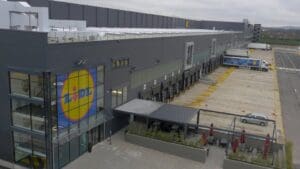 Supermarket chain Lidl has revealed it is recruiting 1,500 new warehouse staff to support its store expansion. The discounter made the announcement as it submitted plans for a 14th distribution center. Lidl said the proposed new site, in Leeds, would bolster the number of roles it was looking to fill by a further 400 if it received approval. Lidl, like its main discount rival Aldi, has been growing its share of the UK grocery market at pace for over a decade through new store openings. It has more than 960 stores currently and has a target of over 1,100. The discounters recently achieved record market shares as value continues to be the focus for shoppers amid surging food inflation and the wider cost of living crisis.
Supermarket chain Lidl has revealed it is recruiting 1,500 new warehouse staff to support its store expansion. The discounter made the announcement as it submitted plans for a 14th distribution center. Lidl said the proposed new site, in Leeds, would bolster the number of roles it was looking to fill by a further 400 if it received approval. Lidl, like its main discount rival Aldi, has been growing its share of the UK grocery market at pace for over a decade through new store openings. It has more than 960 stores currently and has a target of over 1,100. The discounters recently achieved record market shares as value continues to be the focus for shoppers amid surging food inflation and the wider cost of living crisis.
That’s all for this week. Enjoy the weekend, and my favorite song about the impact we’re having on the world and what’s in store if we don’t address climate change and the ongoing problem with pollution, Blackened by Metallica.
[ad_2]
Source link













